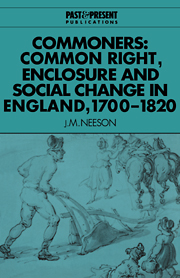Book contents
- Frontmatter
- Contents
- List of tables
- Preface
- Introduction
- 1 The question of value
- I SURVIVAL
- 2 Who had common right?
- 3 Threats before enclosure
- 4 Ordering the commons
- 5 Enforcing the orders
- 6 The uses of waste
- II DECLINE
- III CONCLUSION
- Appendix A Using the Land Tax
- Appendix B Acreage equivalents
- Appendix C Correcting and editing the Land Tax
- Appendix D Landholding estimates
- Bibliography
- Index
- Past and Present Publications
3 - Threats before enclosure
Published online by Cambridge University Press: 01 February 2010
- Frontmatter
- Contents
- List of tables
- Preface
- Introduction
- 1 The question of value
- I SURVIVAL
- 2 Who had common right?
- 3 Threats before enclosure
- 4 Ordering the commons
- 5 Enforcing the orders
- 6 The uses of waste
- II DECLINE
- III CONCLUSION
- Appendix A Using the Land Tax
- Appendix B Acreage equivalents
- Appendix C Correcting and editing the Land Tax
- Appendix D Landholding estimates
- Bibliography
- Index
- Past and Present Publications
Summary
Where all things in common doth rest,
corne field with the pasture and meade,
Though common ye doo for the best,
yet what doth it stand ye in steade?
There common as commoners use,
for otherwise shalt thou not chuse.
Thomas Tusser, Five Hundred Points of Good HusbandryThomas Tusser was not the only farmer critical of commons, and as time went on criticism like his became more and more acceptable. After mid century it became even easier to justify the exclusion of small commoners in the name of improvement; and pasture shortage or worries about labour supply and compensation at enclosure might move the better-off yeomen, tenants and landlords to curtail or extinguish common right long before enclosure. How successful were they? To answer this I want to look at some of the means at their disposal. I shall argue that – compared to an enclosure Act – they were limited, and that the determination of commoners to resist them was an important factor in their survival. For the efforts of lesser commoners to preserve common right were as tenacious as any attempt by great commoners or lords of manors to extinguish it.
RESTRICTING ACCESS TO PASTURE
Engrossing common rights
At all times the incentive for landlords to let their land and rights separately, or to let the land and stock the rights themselves, might be strong. Stripping common right from small parcels of land would free the common pasture from the cows and sheep of small commoners. But the law insisted on the integrity of lands and rights. And other commoners resisted any breach.
- Type
- Chapter
- Information
- CommonersCommon Right, Enclosure and Social Change in England, 1700–1820, pp. 81 - 109Publisher: Cambridge University PressPrint publication year: 1993

